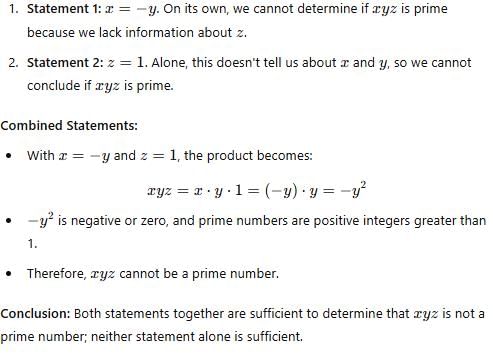Test: Prime Numbers- 1 - GMAT MCQ
20 Questions MCQ Test Quantitative for GMAT - Test: Prime Numbers- 1
If m and n are two different prime numbers, then the least common multiple of the two numbers must equal which one of the following?
Find the average of all the prime numbers that lie between 70 and 100.
| 1 Crore+ students have signed up on EduRev. Have you? Download the App |
If x and y are prime numbers, which of the following CANNOT be the sum of x and y?
An integer greater than 1 that is not prime is called composite. If the two-digit integer n is greater than 20, is n composite?
1) The tens digit of n is a factor of the units digit of n
2) The tens digit of n is 2
If x is a positive integer, is x prime?
1) x has the same number of factors as y2, where y is a positive integer greater than 2.
2) x has the same number of factors as z, where z is a positive integer greater than 2.
Which of the following could be the median of a set consisting of 6 different primes?
If x is an integer, is x! + (x + 1) a prime number?
1) x < 10
2) x is even
If k is a positive integer. Is k a prime number??
1) No integers between "2" and "square root of k" inclusive divides k evenly
2) No integers between 2 and k/2 divides k evenly, and k is greater than 5.
Is the product of three integers xyz a prime number?
1) x = -y
2) z = 1
If p is a prime number greater than 2, what is the value of p?
1) There are a total of 100 prime numbers between 1 and p + 1
2) There are a total of p prime numbers between 1 and 3912
Is the product of two numbers x and y a prime number?
1) x + y = prime
2) y is not prime
Is the product of two numbers x and y a prime number?
1) x - y = prime
2) y is not prime
Is the product of two numbers x and y a prime number?
1) x/y = prime
2) x and y are consecutive integers
Is the product of two numbers x and y a prime number?
1) x is even
2) y is odd
Is the product of two numbers x and y a prime number?
1) x + y = even
2) x is even
If k is a positive integer, is k a prime number??
1) k can be written as 6n + 1, where n is a positive integer.
2) k > 4!
If k is a positive integer, is k a prime number?
1) k is the sum of three consecutive prime numbers
2) k has only 2 factors
Is the integer x a prime number?
1) x + 1 is prime
2) x + 2 is not prime
|
115 videos|106 docs|113 tests
|
|
115 videos|106 docs|113 tests
|



















